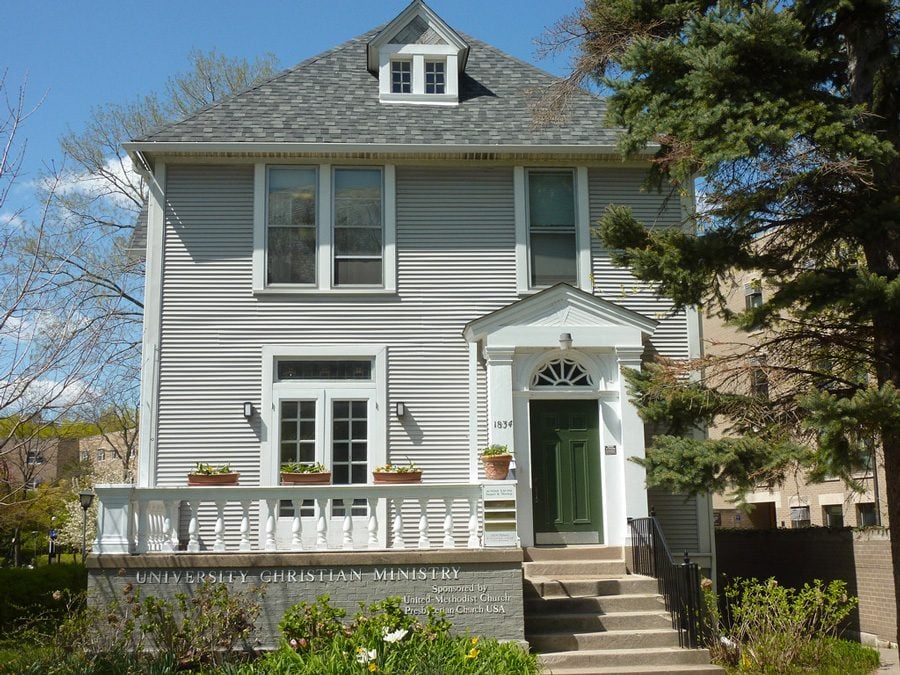Overlooked: Christian Spaces for LGBTQ-identifying students exist despite oppression
Courtesy of University Christian Ministry
University Christian Ministry at 1834 Chicago Ave. The virtual event explored queerness and faith and the journeys of the panelists in reconciling the two.
May 14, 2019
This article is the third in “Overlooked,” a series that explores the experiences of underrepresented groups in different spaces on campus.
Julie Windsor Mitchell has been executive director and campus minister at Northwestern’s University Christian Ministry since 1999. When she was being considered for the role 20 years ago, the hiring committee asked Windsor Mitchell how she felt about LGBT inclusion in the ministry, as queer affirmation was an important aspect of the role.
The ministry was founded under both the Presbyterian Church (USA) and the United Methodist Church. The United Methodist Church has been considered a progressive mainline branch of Protestant Christianity, having allowed female clergy members since 1956, but at a General Conference in February, worldwide delegates voted to uphold the “traditional plan” on homosexuality at a 53 percent majority.
The plan bans same-sex weddings and LGBTQ people from clergy positions. However, about 60 percent of the delegates from the United States voted against the plan, especially delegates from liberal areas like Evanston.
“It’s been a very upsetting situation since our ministry has always been queer-inclusive and many of our students identify as queer,” Windsor Mitchell said. “It’s been very challenging to hear a message from the global church that says you’re not included.”
Despite the vote, Windsor Mitchell said she is striving to keep University Christian Ministry inclusive of all gender identities and sexualities. She said that while exit strategies exist, it isn’t easy for individual churches to disband from the global church, because of doctrinal beliefs that the church should be interconnected.
Windsor Mitchell said she has married same-sex couples, typically UCM alumni, and will continue to do so despite the harsh consequences the United Methodist Church could enact. A first offense yields a six-month suspension and a second offense results in an immediate revoking of ones ordination. She said “fighting” is worth any possible repercussions, because it directly affects future generations, whom she closely works with and for.
“For the sake of all the next groups of young people that will be coming to Northwestern, I don’t want them to grow up in a church where they’re told they can’t be gay and Christian at the same time,” Windsor Mitchell said. “The policy of the United Methodist Church as it currently stands is immoral and unjust and I do not believe it is a Christian point of view.”
UCM is not alone in defying the larger United Methodist Church, as local churches like First United Methodist Church and Urban Village Church continue to advertise acceptance and tolerance toward LGBTQ people on an individual-church level. Garrett-Evangelical Theological Seminary, which sits on Northwestern’s campus, has also rejected the global decision, with the president issuing a statement the day after the General Conference. The other twelve Methodist seminaries in the United States have followed suit.
Second-year seminary student Jamie Sladkey said one of the things that drew her into Garrett was the presence of pride flags in the hallway when she visited. She said the majority of students and staff are affirming, making her comfortable.
“Because I identify as bi, I wasn’t really sure there was a place in ministry for me anymore,” Sladkey said. “But God works in and through those who have been oppressed.”
Sladkey said LGBTQ Christians are oppressed in several ways, including being barred from service within certain denominations. She recalled how she was first introduced to ministry through working at summer camps. During her senior year of undergrad, she decided not to work at a summer camp when she was coming to terms with her sexuality.
Upon finding self-acceptance, Sladkey co-founded a new summer camp, Covenant Youth Collision, which has policies that affirm same-sex relationships and gender identities. One of the programs within Covenant Youth Collision that she found particularly meaningful to work with was Kids College.
“I’ve had LGBTQ students who have worked for me over the summer at Kids College who have talked about how when they didn’t feel like the church could accept them, I’ve helped remind them that God can and will use them,” Sladkey said.
SESP first-year Bobby Read said UCM has been a place so consistently welcoming and open-minded that he considers them a “second family.” He joined Fall Quarter after trying another Christian ministry on campus and not finding acceptance.
“I came out last July to friends and family as gay,” Read said. “I don’t go around waving a rainbow flag everywhere, but it was definitely something that attracted me to UCM.”
Windsor Mitchell said one of her “life missions” was to keep UCM a safe place despite the policies of the greater United Methodist Church. She said the UMC owns the building the University Christian Ministry is housed in, further complicating their relationship with it.
The fact that “United Methodist Church” is written outside the building worries her that students will walk by and believe the organization is homophobic, Windsor Mitchell said. She said she hopes and prays her organization remains a place for reconciliation and spiritual growth.
“There are too many churches that many people have been wounded and hurt in, for what is supposed to be a safe spiritual place for them,” Windsor Mitchell said. “I feel responsible to provide a place that can help people work through whatever trauma they have experienced in the past, so they can know that God loves them and that there is a place for them in the church.”
Email: josiahbonifant2021@u.northwestern.edu
Twitter: @bonijos_iahfant
Related Stories:
– Overlooked: Low-income students in Greek Life struggle with clash between various identities
– Overlooked: Female engineers struggle with lack of equity, but find solidarity with female professors


